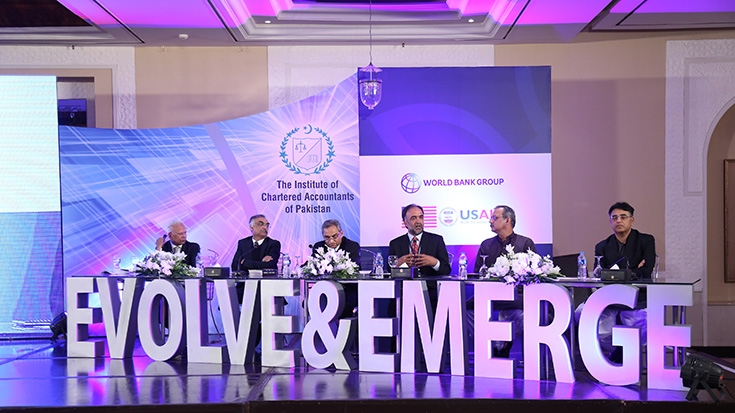Public Financial Management (PFM) in Pakistan has achieved some key milestones over the years, most significant amongst them is development of a centralized and advanced financial reporting system with the support of World Bank through the Pakistan Improving Financial Reporting and Audit Project. A sound foundation of PFM has indeed been laid, but to end poverty and achieve shared prosperity, PFM has to find a renewed role for itself, that of helping the country sail through turbulent macroeconomic environment, get the maximum out of limited available resources, and enhance investors’ confidence. This conference, arranged by the Institute of Chartered Accountants of Pakistan in collaboration with Governance Global Practice, was all about helping public finance managers find that renewed role to emerge as strong contributors to the achievement of national goals.
Dr. Jeins Heling from Germany emphasized the importance of fiscal transparency specifically in the backdrop of European debt crises. He pointed out that the crises commenced with the lack of comparability of member states’ accounting and incoherence between government accounting and finance statistics in Greece. On the budgeting and planning side, Hanid Mukhtar, a senior economist, emphasized that to make a real impact on the lives of people and to ensure service delivery, a balance needs to be struck between allocation of development budget for new inititaives and salaries, maintenance and other recurrent expenditures. Dr. Ishrat Hussain, former Governor of the State Bank of Pakistan, while addressing the role of audit in the PFM cycle, called for creation of a Supreme Audit Institution which is not only more independent & autonomous but has professional, competent staff. Ian Ball, a renowned expert on the subject, cited the example of New Zealand, where effective PFM systems resulted in successful public welfare programs.
The key takeaways from the conference were:
- Need to establish Government Accounting Standards Board
- Shift all public sector enterprises, ministries, departments and authorities to accrual accounting to bring transparency and efficiency
- Use of financial management information system for decision making to establish strong cash flow and budget management mechanism
- Judicious and equitable revenue collection
- Budgets driven by long term development policies; equal importance for recurrent budget expenditures
- PFM mechanism geared toward service delivery
- Need for creation of a Supreme Audit Institution
There was a general consensus amongst the participants that creation of partnerships and development of political will and culture would play a key role in the successful PFM evolution. Federal Minister for Privatization Muhammad Zubair and Federal Minister for Planning, Development and Reforms Ahsan Iqbal chaired the opening and closing sessions of the conference, respectively.

